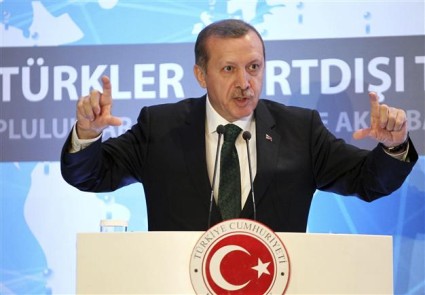Despite a corruption scandal with threats of prosecution, despite questions over his Government’s tactics of repression, Turkish Prime Minister Recep Tayyip Erdogan and his Justice and Development Party (AKP) have triumphed once again.
In Sunday’s local elections, the AKP took more then 45%, a notable increase on their return in 2009. Brushing aside criticisms from opposition parties that the elections were not carried out fairly, Erdogan will claim “legitimacy” from the ballot box.
The Prime Minister does not need to negotiate or give concessions. Instead, he will consolidate “democratic authority” while protecting “national security”. He will wrap himself in the support of the majority — or close enough to it — while accusing opponents of “high treason” and trying to break the Hizmet (Service) Movement of Fettullah Gulen.
The combined efforts of two parties – the Republic People’s Party (CHP) and the Nationalist Movement Party (MHP) – could not dent the AKP, leaving the opposition camp weaker. Meanwhile, the pro-Kurdish Peace and Democracy Party (BDP) will become the ruling party’s natural ally, as Erdogan puts forth his pursuit of a long-awaited solution of the Kurdish question.
A senior member of the outlawed KCK (Kurdistan Communities Union), Duran Kalkan tried to maintain pressure on the Government: “The AKP came out from the ballot box with success, with lots of votes. However, it does not mean that the AKP won a victory and ruled out the intervention against itself. If the AKP thinks so, they will be in a huge mistake. Their challengers will not stop.“
But Erdogan’s attention will be on the BDP, which expects the transformation of “dialogue” into negotiations with imprisoned Kurdish leader Abdullah Ocalan. In addition, the BDP wants local autonomy under the new constitution and freedom for Ocalan.
The Prime Minister is likely to play his “new constitution” card and ask for the BDP’s full support for the Presidential election in August, in which the decision will be with the people rather than Parliament For the first time. the President will be elected by the people; not the Parliament.
Until then, do not expect big initiatives from Erdogan, apart from tightening his grip on State mechanisms and media to deflect the corruption allegations. After the Presidential ballot, Kurds may get local authority, provided that this does not challenge Ankara’s “one nation, one state, and one leader”.
And beyond Turkey? Ankara could go back to its 2002-2004 period of “democratization packages” and law-making with an eye on the European Union. However, Foreign Minister Ahmet Davuloglu’s “zero-problems with neighbors” policy is long gone. As last week’s leaked audio tape established, the Government is ready to ramp up its intervention — to the point of military action — in support of Syria’s insurgency.
This is a stronger Erdogan, and that means an assertive Erdogan taking on “traitorous” opponents at home and “bloody dictators” abroad.

